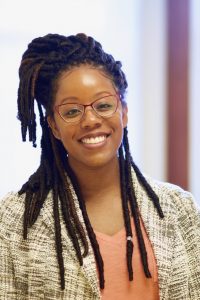 Amelia Gibson, assistant professor in the UNC School of Information and Library Science (SILS).
Amelia Gibson, assistant professor in the UNC School of Information and Library Science (SILS).
AMELIA GIBSON is an assistant professor in the UNC School of Information and Library Science (SILS), where she studies health, wellness, and information practices and access in local communities and on the internet.
As faculty, we build on the work of others when we do research. Journal articles are the medium for having conversations across institutions. That’s important in terms of research and for preserving knowledge in the academy.
But I would say that’s limited because, as a community engaged researcher, I build with people in and outside of the academy, and people outside the academy don’t generally have access to the journals in which we publish our work. That limits my ability to reach people outside of institutions that have money for journals.
I do a lot of work with autistic folks—teens and young adults on the spectrum. I do research with them on information access and marginalization, public data access, understanding public data and health information. This kind of cooperation takes a lot of time—especially from community partners.
When I publish, oftentimes my articles are just not accessible to community members and professionals outside of universities. That’s part of the reason that I use the Carolina Digital Repository. I can then send them a link directly to the article and they can find it there.
As far as I’m concerned, I have a personal obligation to make sure that citizens can access research when they need it to support decision making in local government, or other organizations in communities. They can say, “Hey, this researcher found this thing. You are responsible for making this better or helping us to make this better.” But right now, unless a researcher gives access, that’s not something that is accessible to most people.
One of the messages we get as junior faculty members is that Carolina places emphasis on our research serving the people of North Carolina. I’ve tried to make that a priority in my own work. My first year, a lot of my start-up was spent traveling around the state to meet families and people with different disabilities. That’s a lot of investment in terms of building a research agenda that will benefit the state.
But if people in the state can’t access that work, then they can’t do anything with it. It becomes something that we’ve funded and devoted time and energy to but that sits in a digital space somewhere. Never being accessed, never being used. Or being found too late to be useful.
